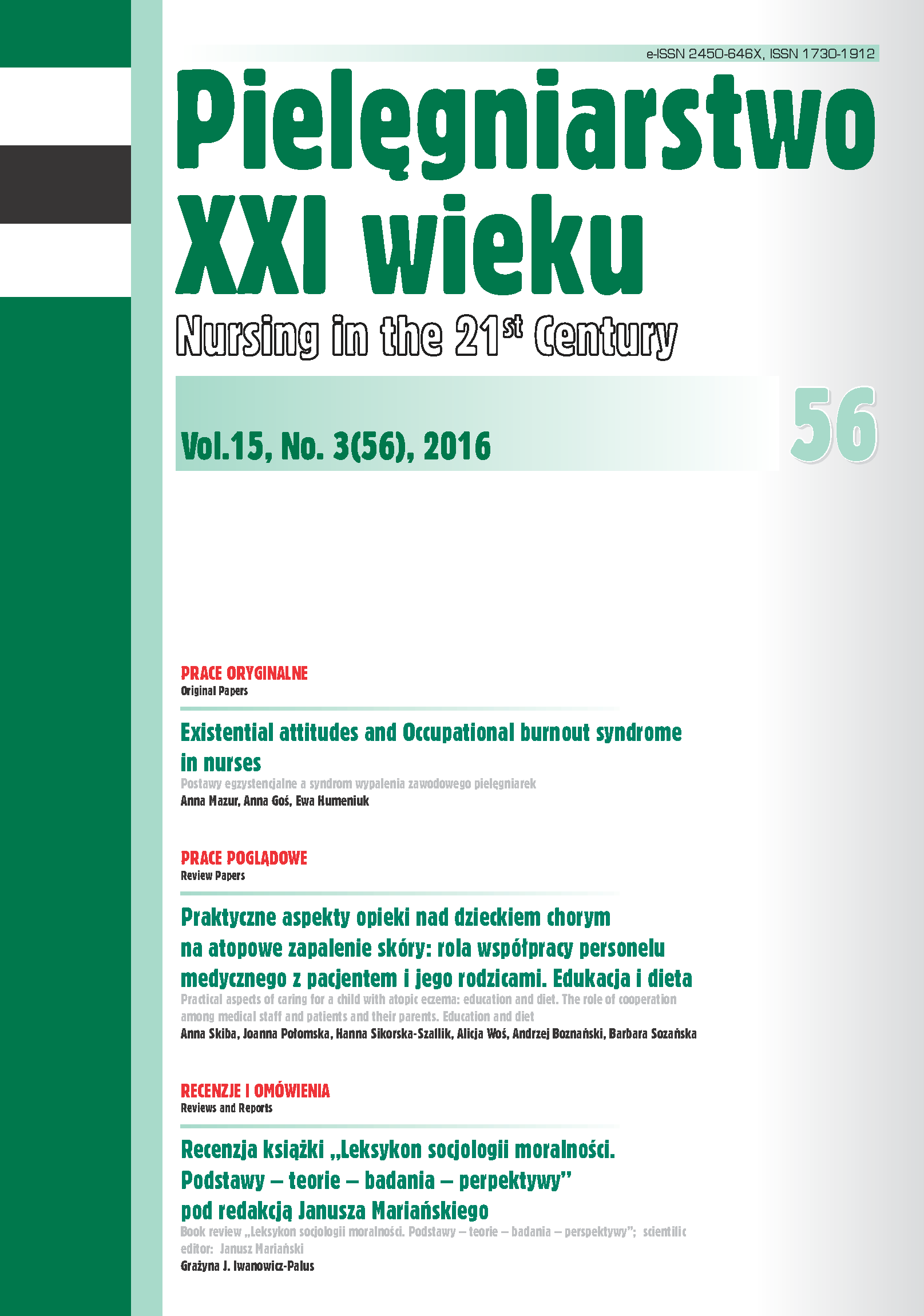Existential attitudes and occupational burnout syndrome in nurses
DOI:
https://doi.org/10.1515/pielxxiw-2016-0021Keywords:
existential attitudes, Occupational burnout, nursesAbstract
EXISTENTIAL ATTITUDES AND OCCUPATIONAL BURNOUT SYNDROME IN NURSES
Aim. The aim of the study was to determine the relation between existential attitudes and occupational burnout in nurses.
Material and methods. The research sample consisted of 120 nurses. Life Attitudes Profile – Revised (the LAP-R) adapted by R. Klamut and Link Burnout Questionnaire (the LBQ) adapted by A. Jaworowska were used in the research.
Results. Psycho-physical exhaustion and relationship deterioration correlate negatively with life goals, internal consistency, life control, death acceptance and positively with existential void and goal seeking. Sense of professional failure and disillusion present a conversely proportional relation with goal, coherence, life control as well as an inversely proportional relation with existential void and goal seeking.
Conclusions. The analyses performed in the course of the research proved that existential attitudes accompany burnout in nurses. The obtained results of the authors’ own research present cognitive value and can be used to develop both prevention and aid programs aimed at enhancing the quality of personal and professional functioning of nurses.
References
1. Sęk H. red. Wypalenie zawodowe. Przyczyny i zapobieganie. Warszawa: Wydawnictwo Naukowe PWN; 2012.
2. Wilczek-Rużyczka E. Wypalenie zawodowe pracowników medycznych. Warszawa: Wolters Kluwer SA.
3. Li YY, Li LP. An investigation on job burnout of medical personnel in a top three hospital. Zhonghua Lao Dong Wei Sheng Zhi Ye Bing Za Zhi. 2016; 20; 34 (5): 357-360.
4. Lewandowska A, Litwin B. Wypalenie zawodowe jako zagrożenie w pracy pielęgniarki. Rocz Pom AM. 2009; 55 (3): 86-89.
5. Queiros C, Carlotto MS, Kaiseler M et al. Predictors of burnout among nurses: An integrationists approach. Psicothema. 2013; 25 (3): 330-335.
6. Uchmanowicz I, Jankowska-Polańska B, Bronowicka G. Zjawisko wypalenia zawodowego wśród pielęgniarek pracujących na oddziałach onkologicznych - badania wstępne. Probl. Pielęg. 2013; 21 (4): 476-483.
7. Santinello M. LBQ Kwestionariusz Wypalenia Zawodowego. Podręcznik. Warszawa: Pracownia Testów Psychologicznych PTP; 2014.
8. Reker GT, Peacock EJ. The Life Attitude Profile (LAP): A multidimensional instrument for assessing attitudes toward life. Can J of Behav Science. 1981; 13 (3): 264-273.
9. Reker GT, Wong PT. Aging as an individual process: Toward The theory of personal meaning. [w:] Birren JE, Bengtson VL, red. Emergent the theories of aging. New York: Springer Publishing; 1988, s. 214-246.
10. Reker GT. Life Attitude Profile - Revised (LAP-R). Ontario: Students Psychologists Press; 1992.
11. Klamut R. Kwestionariusz Postaw Życiowych KPŻ. Podręcznik do polskiej adaptacji Kwestionariusza Life Attitude Profile-Revised (LAP-R) Gary’ego T. Rekera. Warszawa: Pracownia Testów Psychologicznych PTP; 2010.
12. Jaworowska A. Kwestionariusz Wypalenia Zawodowego LBQ M. Santinello. Polska normalizacja. Warszawa: Pracownia Testów Psychologicznych PTP; 2014.
13. Durkin M, Beaumont E, Hollins MCJ, Carson J. A pilot study exploring the relationship between self-compassion, self-judgment, self-kindness, compassion, professional quality of life and wellbeing among UK community nurses. Nurse Educ Today. 2016; 30 (46): 109-114.
14. Kolthoff KL, Hickman SE. Compassion fatigue among nurses working with older adults. Geriatr Nurs. 2016; 4572 (16): 154-159.
15. Lee Y, Seomun G. Role of compassion competence among clinical nurses in professional quality of life. Int Nurs Rev. 2016; 63 (3): 381-387.
16. Vander ET, Cavents C, Daneels K et al. Job demands-resources predicting burnout and work engagement among Belgian home health care nurses: A cross-sectional study. Nurs Outlook. 2016; 54 (16): 30112-30119.
17. Admi H, Eilon-Moshe Y. Do hospital shift charge nurses from different cultures experience similar stress: An international cross sectional study. Int J Nurs Stud. 2016; 26 (63): 48-57.
Published
Issue
Section
License
Copyright (c) 2016 Authors

This work is licensed under a Creative Commons Attribution-NonCommercial-NoDerivatives 3.0 Unported License.




